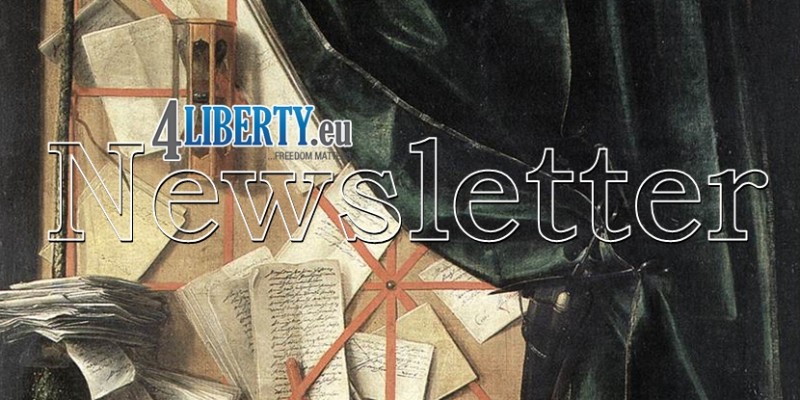
In the country of the Vistula River fiction is more and more often surpassing reality. In fact, it becomes reality before Poles’ very eyes. Moreover, they begin to arrange themselves in it, stunned by events that would have been unimaginable for the average person just a few weeks before.
However, Poles, who are accustomed to living in the fumes of absurdity, quickly tame the next shock and come to terms with it. In recent days, for example, Poles have been arguing about whether the U.S. is seriously considering imposing sanctions on Poland.
After all, if in March 2010 somebody said that he was writing a book in which the main plot was a tragic death of the Polish president together with his wife and almost a hundred of the most important people in the country in a plane crash, additionally on the territory of Russia, and the purpose of this would-be visit of the head of state was to honor Polish officers murdered in Katyn; if somebody intended to write that this president (falling down in the polls) would be buried on Wawel among Polish kings and national heroes; if this person had made up an idea that the funeral ceremony of the Presidential couple would not be attended by the Heads of State because the volcano in Iceland would erupt then and the sky over the whole Europe would be covered with volcanic dust and only the President of Georgia would manage to get to Poland; if this person had pushed the idea that after a short moment of shock there would be Poles who would start accusing the Polish Prime Minister for the death of the Polish President who allegedly cooperated with a Russian satrap, I am sure you would find such a story completely unbelievable and too far-fetched to be a plot of a more ambitious book.
But we live between the Odra and Bug rivers. Apparently, in this geographical and cultural space the most improbable stories become reality. Reality seems to be cracking here and through the cracks between the worlds some phantasms and delusions are penetrating, which quickly impersonate rationality and surprisingly easily settle in our minds.
After all, if some other person – let’s say an ambitious analyst – had claimed in June 2021 that soon Poland, completely alone on the international arena, would challenge the U.S., would he have been taken seriously? If that person mentioned that the United States of America, our greatest ally, the guarantor of our independence, the model and matrix for many generations of Poles, might soon consider introducing sanctions against Poland, would them not be met with a pitying look?
But it is no longer fiction. This absurdity has become part of our reality before our eyes. The attempt to implement changes in the media law, which actually hit only TVN (hence “lex TVN”), is a clear attack on American capital. The apllication of some unspecified sanctions by the U.S in response to this event is a real issue under discussion. Moreover, it is referred to by the most important Polish politicians. Even if it turned out that such an option was not on the table, that is not the point. The point is that the situation was unimaginable just a few months ago.
Similarly, the fact of systematic destruction of the judiciary, turning TVP into a tube for the most primitive propaganda, turning the citizens against each other, calling people an ideology, using the pandemic for the leftist interests, wasting billions of public money, and above all, the complete and open deviation from the democratic path were unthinkable in Poland only a few years ago.
Not so long ago, we were set as an example. In addition, Polish experts advised other countries on how to make a bloodless transition from dictatorship to a flourishing democracy, how to build efficient institutions and a perfectly functioning self-government…
However, Poland easily allowed fiction to become reality. But after all, should there be a limit? Or maybe there really isn’t. Maybe everything is possible on the banks of the Vistula… Since we are already fantasizing so much, why not go all the way!
In 1995, Konrad T. Lewandowski, a columnist and editor well-known at that time among fantasy fans, went for the whole story. His short story “Noteka 2015” published in Nowa Fantastyka (a Polish speculative fiction monthly fantasy and science fiction magazine). “Noteka 2015” quickly gained a label of iconic. It was so peculiar that when I asked the late Maciej Parowski – writer and editor-in-chief of Fantastyka (who was a guest at the 2017 Freedom Games in Lodz), he remembered it well despite more than 20 years since publication.
The subject of the story is a fictional Polish-American conflict – a war the U.S. declared on Poland supposedly in defense of democracy. The story takes place in 2015 – there is a coup d’état in Poland. The president appoints himself Chief of State and disperses the parliament, where there is a festival of accusing each other’s parties and individual MPs of being agents for Russia.
It turns out that something is really going on because the evidence of betrayal of individual parliamentarians is strong. The world looks with horror at the events in Poland. Nevertheless, the most hostile is not Russia, but the United States. It turns out that the U.S. signed a secret agreement with the Russian mafia – in exchange for guarding the Russian nuclear arsenals (the structures of the Russian state are in disarray and the real power in the country is held by mafia families), the Americans gave the mafia a free hand in Poland.
The new U.S. president, fearing that the Russians will withdraw from the agreement, decides to teach Poland a lesson and, under the pretext of fighting for the restoration of democracy in our country, conduct a small victorious campaign gaining popularity in the country and, at the same time, ridiculing the Polish army.
Now the most interesting part. The Polish staff officers, realizing the gigantic difference in potential between the two countries, decide to act unconventionally and hire as a consultant a journalist Radosław Tomaszewski, who published in one of the tabloids several fabricated articles about the alleged new tactics that the Polish Army is supposedly testing on the battlefield. He used for this purpose the theory of chaos and turbulence – in simple terms, it was about avoiding the concentration of troops before a sudden and unexpected attack.
Following Tomaszewski’s recommendations, the Polish army, thanks to its dedication and incredible creativity, emerges victorious from the frontal battle, which takes place on the Noteć River (the Americans could not pronounce the name of the river correctly – hence Noteka).
The story is extremely brilliant, written with great charm and a sense of humor. The author also has some extremely pertinent and timely observations.
For example, on scene – the protagonist, returning from work, passes people demonstrating in Warsaw and the following thought comes to his mind:
“And somehow there was no particularly loud demand for democracy. On the contrary. In the city you could feel a great ease and relief that we finally stopped being stretched and trimmed to European dimensions. The police were calmly directing the movement of the demonstration, most of whom were demanding various things, but not democracy. It seemed that at last we had our favorite system – a dictatorship without terror.”
Could it be that Jaroslaw Kaczynski read the 2015 Note and drew far-reaching conclusions from it? Why would not he? Let’s just hope he does not take the application of chaos and turbulence theory on the battlefield literally and does not want to try it out in a confrontation with the U.S.
Note that 2021 might not end so well for Poland. Of course, this is a joke, fiction, satire… but what is reality for the Poles? Sometimes it’s just fiction pushed back in time.
However, the real United States (in contrast to the fictional U.S invented by Konrad T. Lewandowski) takes seriously the issue of common values for the Western civilization and the need to consolidate the democratic world in defense against the growing power of China.
Russia is not a failed state. The European Union is not as powerless as the Polish national right wing generally thinks. Ukraine will not be a poor country and a reservoir of cheap labor forever. Belarus practices state terrorism and lies just across the border. Poland is alone. A brilliant and creative journalist developing new tactics on the battlefield will not save Poles.
Poland strength is its belonging to the Western world, its independent institutions, its commitment to democratic values, its political community and its great culture. If Poles continue to accept the domination of fiction over rational judgment, they may be sorely miscalculated in their geopolitical position. After all, Poland has painfully learned this lesson more than once in history.
I would like to thank Damian Sujecki for digging out for me the April 1995 issue of “Nowa Fantastyka”, which allowed me to read this excellent story once again, after 26 years.
Written by:
Rafal Jaskowski – historian, political scientist, doctor of social sciences in the discipline of political science and administration. Former journalist of “Dziennik Łódzki” and spokesman of the Regional Council of Lodz.
The article was originally published in Polish at: https://liberte.pl/polska-fikcja-rzeczywista-czyli-noteka-2021/
Translated by Natalia Banas
Continue exploring:
Nord Stream 2: If You Cannot Beat Them, Join Them
How Different Are We? The World Seen Through Eyes of Right-Wing Voters























